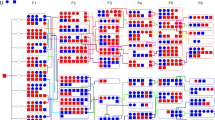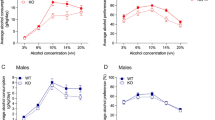Abstract
Mice from various inbred strains consume alcoholic beverages at highly reproducible and strain–specific levels. While most mice consume alcohol in moderate amounts, C57BL/6J animals exhibit sustained oral ingestion of high levels of alcohol in the presence of competing water and food. We now report a genetic investigation of this phenotype as one potential model for alcoholism. An intercross–backcross breeding protocol was used to identify two recessive alcohol preference quantitative trait loci (QTLs) that are both sex–restricted in expression. A comparison of our results with those of an earlier morphine preference study argues against the hypothesis of a single unified phenotype defined by a preference for all euphoria–producing drugs.
This is a preview of subscription content, access via your institution
Access options
Subscribe to this journal
Receive 12 print issues and online access
$209.00 per year
only $17.42 per issue
Buy this article
- Purchase on Springer Link
- Instant access to full article PDF
Prices may be subject to local taxes which are calculated during checkout
Similar content being viewed by others
References
Devor, E.J. & Cloninger, C.R. Genetics of alcoholism. Anna. Rev. Genet. 23, 19–36 (1989).
Begleiter, H. & Kissin, B., Genetics of Alcoholism. (Oxford University Press, New York, 1995).
Dietrich, W.F. et al. Genetic identification of Mom-1, a major modifier locus affecting Min-induced intestinal neoplasia in the mouse. Cell 75, 631–639 (1993).
Mock, B.A., Krall, M.M. & Dosik, J.K. Genetic mapping of tumor susceptibility genes involved in mouse plasmacytomagenesis. Proc. Natl. Acad. Sci. USA. 90, 9499–9505 (1993).
Jacoby, R.F. et al. Genetic analysis of colon cancer susceptibility in mice. Genomics 22, 381–387 (1994).
Lee, G.-H., Bennett, L.M., Carabeo, R.A. & Drinkwater, N.R. Identification of hepatocarcinogen-resistance genes in DB/2Mice. Genetics 139, 387–395 (1995).
Nagase, H. et al. Distinct genetic loci control development of benign and malignant skin tumours in mice. Nature Genet. 10, 424–429 (1995).
Hilbert, P. et al. Chromosomal mapping of two genetic loci associated with blood-pressure regulation in hereditary hypertensive rats. Nature 353, 521–529 (1991).
Jacob, H.J. et al. Genetic mapping of a gene causing hypertension in the stroke-prone spontaneously hypertensive rat. Cell 67, 213–224 (1991).
De Sanctis, G.T. et al. Quantitative locus analysis of airway hyperresponsiveness in A/J and C57BL/6J mice. Nature Genet. 11, 150–154 (1995).
Hesselbrock, M.N. in The Genetics of Alcoholism (eds Begleiter, H. & Kissin, B.) 40–69 (Oxford University Press, New York, 1995).
McClearn, G.E. & Rodgers, D.A. Differences in alcohol preference among inbred strains of mice. Quart. J. Stud. Alcoh. 20, 691–695 (1959).
Crabbe, J. Genetic animal models in the study of alcoholism. Alcohol. Clin. Exp. Res. 13, 120–127 (1989).
Berrettini, W.H., Ferraro, T.N., Alexander, R.C., Buchberg, A.M. & Vogel, W.H. Quantitative trait loci mapping of three loci controlling morphine preference using inbred mouse strains. Alcohole Genef. 7, 54–58 (1994).
McClearn, G.E. & Rodgers, D.A. Genetic factors in alcohol preference of laboratory mice. J. Comp. Physiol. Psychol. 54, 116–119 (1961).
Bond, S.L., Wigle, M.R. & Singh, S.M. Acetaldehyde dehydrogenase (Ahd-2)-associated DNA polymorphisms in mouse strains with variable ethanol preferences. Alcohol. Clin. Exp. Res. 15, 304–307 (1991).
Lumeng, L., Murphy, J.M., McBride, W.J. & Li, T.-K. in The Genetics of Alcoholism. (eds. Begleiter, H. & Kissin, B.) 165–201 (Oxford University Press, New York, 1995).
Plomin, R. & McClearn, G.E. Quantitative trait loci (QTL) analyses and alcohol-related behaviors. Behav. Genet. 23, 197–211 (1993).
Phillips, T.J., Crabbe, J.C., Metten, P. & Belknap, J. Localization of genes affecting alcohol drinking in mice. Alcohol. Clin. Exp. Res. 18, 931–941 (1994).
Rodriguez, L.A., Plomin, R., Blizard, D.A., Jones, B.C. & McClearn, G.E. Alcohol acceptance, preference, and sensitivity in mice II. Quantitative trait loci mapping analysis using BXD recombinant inbred strains. Alcohol. Clin. Exp. Res. 19, 367–373 (1995).
Silver, L.M., Concepts and Application. (Oxford University Press, New York, 1995).
Crabbe, J.C., Belknap, J.K. & Buck, K.J. Genetic animal models of alcohol and drug abuse. Science 264, 1715–1723 (1994).
Lander, E. & Kruglyak, L. Genetic dissection of complex traits: guidelines for interpreting and reporting results. Nature Genet. 11, 241–247 (1995).
Rodgers, D.A. & McClearn, G.E. Mouse strain differences in preference for various concentrations of alcohol. Quart. J. Stud. Alcoh. 23, 26–33 (1962).
Harada, S., Agarwal, D.P., Goedde, H.W., Tagaki, S. & Ishikawa, B. Possible protective role against alcoholism for aldehyde dehydrogenase deficiency in Japan. Lancet. 2, 827 (1982).
Thomasson, H.R., Edenberg, H.J., Crabb, D.W. & Al, E. Alcohol and aldehyde dehydrogenase genotypes and alcoholism in Chinese men. Am. J. Hum. Genet. 48, 677–681 (1991).
Thomasson, H.R., Crabb, D.W., Edenberg, H.J. & Li, T.-K. Alcohol and aldehyde dehydrogenase polymorphisms and alcoholism. Behav. Genet. 23, 131–136 (1993).
Rodriguez, LA., Plomin, R., Blizard, DA., Jones, B.C., McClearn, G.E. Alcohol acceptance, preference, and sensitivity in mice. I. Quantitative genetic analysis using BXD recombinant inbred strains. Alcohol. Clin. Exp. Res. 18, 1416–1422 (1994).
Plomin, R., McClearn, G.E., Gora-Maslak, G. & Neiderhiser, J.M. Use of recombinant inbred strains to detect quantitative trait loci associated with behavior. Behav Genet. 21, 99–116 (1991).
Hesselbrock, V.M. in The Genetics of Alcoholism (eds Begleiter, H. & Kissin, B.) 17–39 (Oxford University Press, New York, 1995).
Bohman, M., Sigvardsson, S. & Cloninger, C.R. Maternal inheritance of alcohol abuse: cross-fostering analysis of adopted women. Arch. Gen. Psych. 38, 965–969 (1981).
Cattanach, B.M. & Kirk, M. Differential activity of maternally and paternally derived chromosome regions in mice. Nature 315, 469–498 (1985).
McMahon, F.J., Stine, O.C., Meyers, D.A., Simpson, S.G. & DePaulo, J.R. Patterns of maternal transmission in bipolar affective disorder Am. J. Hum. Genet. 56, 1277–86 (1995).
Gregor, P. et al. Murine serotonin transporter: sequence and localization to Chromosome 11. Mammal. Genome. 4, 283–284 (1993).
Schuckit, M.A. A clinical model of genetic influences in alcohol dependence. J. Stud. Alcohol. 55, 5–17 (1994).
Rausch, J.L., Monteiro, M.G. & Schuckit, M.A. Platlet serotonin uptake in men with family histories of alcoholism. Neuropsychopharmacology 4, 83–86 (1991).
Alexander, R.C., Duda, J., Vogel, W. & Berrettini, W.H. Morphine and cocaine preference in inbred mice. Psychiat. Genet. 3, 33–37 (1993).
Dietrich, W.F. & others. A genetic map of the mouse with 4,006 simple sequence length polymorphisms. Nature Genet. 7, 220–245 (1994).
Soller, M. & Brody, T. On the power of experimental designs for the detection of linkage between marker loci and quantitative loci in crosses between inbred lines. Theor. Appl. Genet. 47, 35–39 (1976).
Martinez, O. & Curnow, R.N. Estimating the locations and the sizes of the effects of quantitative trait loci using flanking markers. Theor. Appl. Genet. 85, 480–488 (1992).
Xu, S. A comment on the simple regression method of interval mapping. Genetics 141, 1657–1659 (1995).
Author information
Authors and Affiliations
Rights and permissions
About this article
Cite this article
Melo, J., Shendure, J., Pociask, K. et al. Identification of sex–specific quantitative trait loci controlling alcohol preference in C57BL/6 mice. Nat Genet 13, 147–153 (1996). https://doi.org/10.1038/ng0696-147
Received:
Accepted:
Issue Date:
DOI: https://doi.org/10.1038/ng0696-147
This article is cited by
-
Genetics of mouse behavioral and peripheral neural responses to sucrose
Mammalian Genome (2021)
-
Influence of sex on genetic regulation of “drinking in the dark” alcohol consumption
Mammalian Genome (2015)
-
Quantitative trait loci for sensitivity to ethanol intoxication in a C57BL/6J × 129S1/SvImJ inbred mouse cross
Mammalian Genome (2012)
-
Hybrid Mice as Genetic Models of High Alcohol Consumption
Behavior Genetics (2010)
-
Genetic factors influencing alcohol dependence
British Journal of Pharmacology (2008)



